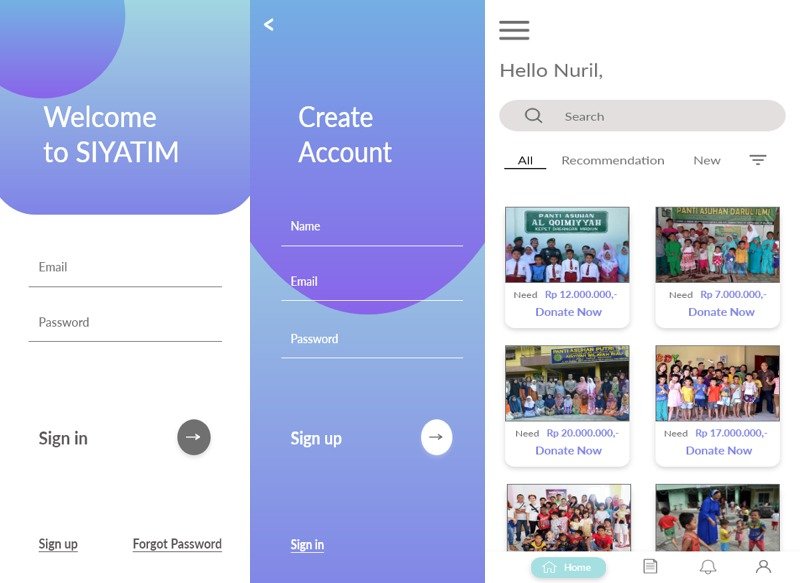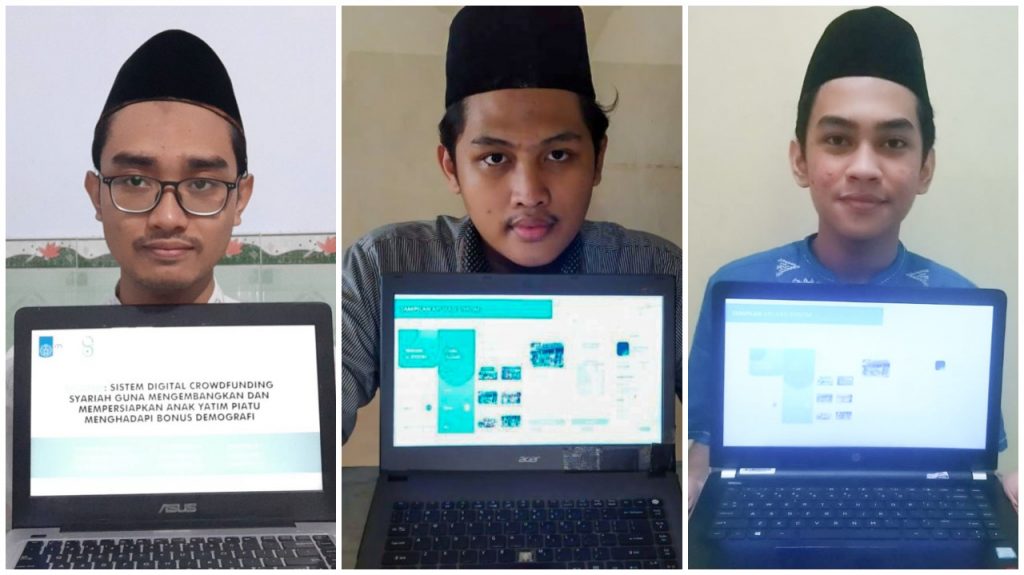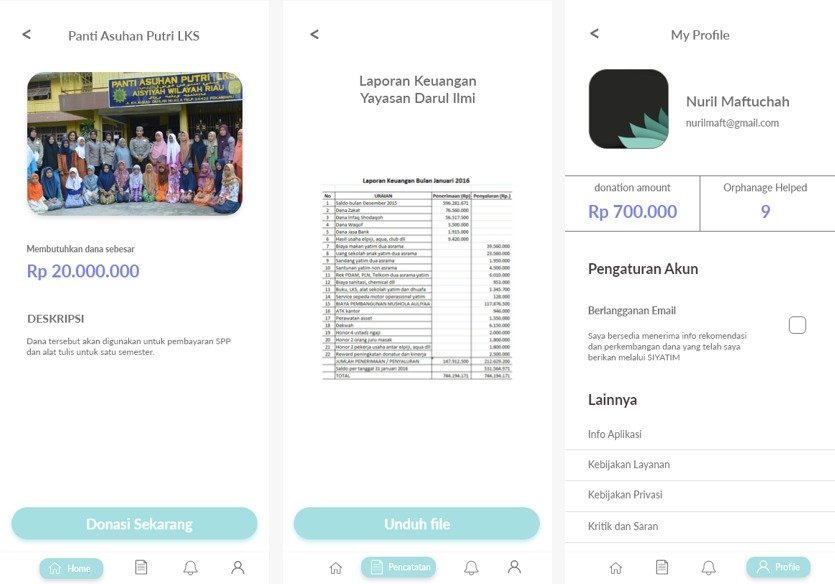ITS Students Design Siyatim, Digital Donation System for Orphans

Display of the Siyatim mobile application designed by ITS students
ITS Campus, ITS News – The development of information technology presents new alternatives to facilitate the crowdfunding movement. This condition was successfully utilized by students of Institut Teknologi Sepuluh Nopember (ITS) by designing Siyatim, digital crowdfunding system based on sharia. Through this system, the donations that have been collected will be directly distributed to orphans in need.
Siyatim’s main founder, Muhammad Ainul Yaqin, said that the crowdfunding platform is currently giving hope to the Indonesian economy. Because in the last two years, there has been an increase in the number of donors up to 80 percent.
In addition to being more transparent, according to the student who is often called Yaqin, digital crowdfunding facilities tend to ensure reports on the progress of donations through well-maintained interactions. “So don’t be surprised if many millennial generations prefer this method,” he said.
This condition made Yaqin and her two colleagues, Fajrur Rido Ataubakumarwa and Gita Rama Mahardhika, design a crowdfunding system in the form of a mobile application. This young man continued his design platform was specifically for orphans who needed help. “We chose a target (orphans) like this because in Indonesia there is still no special platform to cover them,” said the student of the Industrial and Systems Engineering Department.”
Yaqin explained, Siyatim explained the added value compared to other systems in the form of access for donors to choose their orphanages that they asked to donate. Besides, donors can also monitor the use of the funds they donate. It does not stop there, Siyatim also classifies orphanages according to their needs such as the category of needing basic assistance and the category of educational assistance. “This is because each orphanage needs different assistance,” he said.
 Siyatim Founder, Muhammad Ainul Yaqin (center) with his two colleagues, Gita Rama Mahardhika (right) and Fajrur Rido Ataubakumarwa (left) showing the idea of a sharia-based digital crowdfunding system for orphans
Siyatim Founder, Muhammad Ainul Yaqin (center) with his two colleagues, Gita Rama Mahardhika (right) and Fajrur Rido Ataubakumarwa (left) showing the idea of a sharia-based digital crowdfunding system for orphans
Interestingly, added Yaqin, Siyatim presents an online adoption feature where donors can directly make donations to certain children who are registered at the orphanage. Through this feature, donors can specifically monitor the development of the children they adopt. Donors can also provide scholarship assistance in the form of Education Development Contribution payments (SPP), pocket money, and other facilities. “So, this adoption means that the child gets a special donor,” said the 2017 student.
Yaqin said that this design innovation requires the contribution of many parties to be realized. He feels that his breakthrough will be a solution for the revival of the orphanage and its residents. From this system, the orphanage is also developed so that it can be independent and not only rely on donors. “The main goal, The orphanages we support can give birth to golden generations who can face the demographic dividend,” he said.
Not just an idea, this breakthrough designed by Yaqin and his colleagues won third place in the 2020 National Musabaqah Tilawatil Quran (MTQ) competition for the category of Al-Quran Scientific Writing (KTIA), last mid-October. Amazingly, the system that is currently in the development stage has become a start-up under the ITS Industrial Incubator UPT. “In the future, I hope that Siyatim can become the main choice of people throughout Indonesia,” concluded Yaqin enthusiastically. (Dik/ITS Public Relations)

Display in the Siyatim application that can be accessed by the account owner
Related News
-
Facilitating Creativity of Students, ITS Information Systems Department Presents CCWS
ITS Department of Information Systems students conduct a discussion in one of the available spaces in the ITS Digital
November 02, 2020 08:11 -
ITS Explores Electrification Cooperation with PT Vale Indonesia
ITS Campus, ITS News — Following up on the Memorandum of Understanding (MoU) with PT Vale Indonesia, Institut Teknologi
November 02, 2020 08:11 -
ITS Reaches Top 7 BRIN Collaborators with 309 Scientific Publications
ITS Campus, ITS News — Institut Teknologi Sepuluh Nopember (ITS) continues demonstrating its commitment to strengthening collaboration in research
November 02, 2020 08:11 -
The Only One from Indonesia, ITS Student Becomes Erasmus+ Scholarship Awardee
ITS Campus, ITS News — Civitas academica of Institut Teknologi Sepuluh Nopember (ITS) has once again contributed to making
November 02, 2020 08:11
